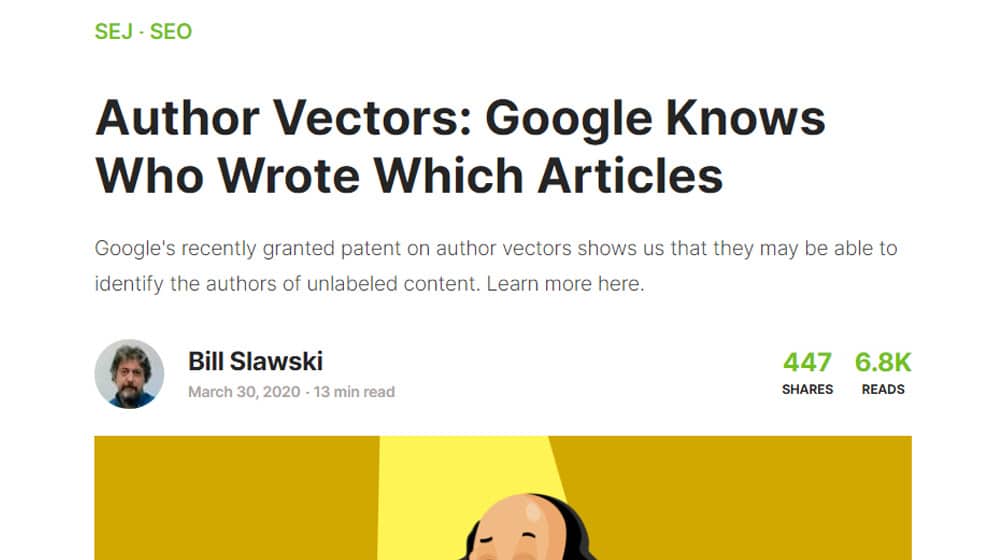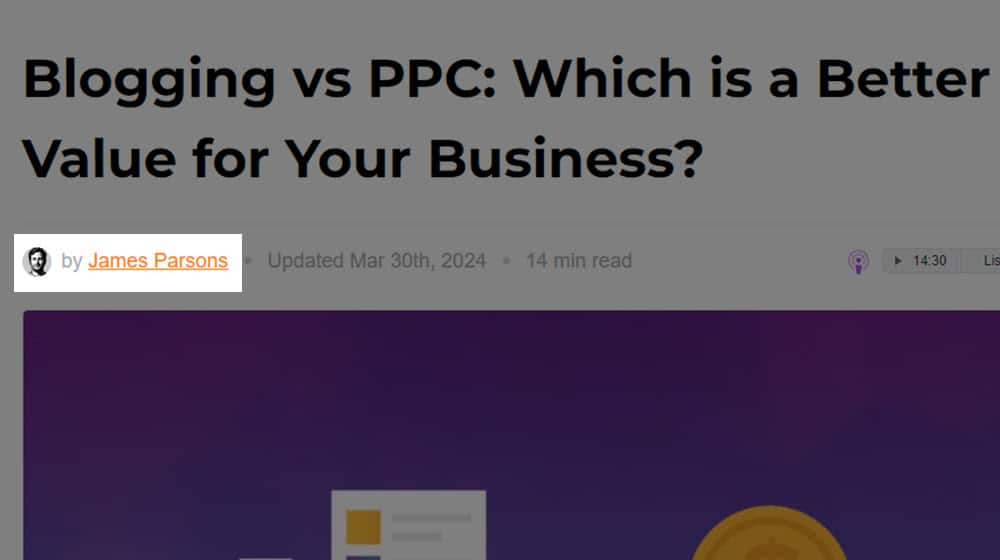Are Company, Team, or Group Author Names Bad for SEO?

When you're writing a blog post for your company blog, do you get credit?
Do you want credit?
There are some serious questions to be answered in this discussion. There are also several different points of view you can have, though in my mind, there's only one real right answer. So, let's talk about it!
To Name or Not to Name
The first decision you need to make is whether or not there's a name attached to the blog posts you write. In general, I've seen three different answers to this question.
The first answer is yes; there should be a name attached. It's what I do and what many other bloggers do. We have a name attributing the writing at the top of the blog post under the title and an author bio block at the end of the post. Sometimes, the author bio is part of the content, but more often, it's a distinct code block at the bottom of the page.

The second answer is a less common one, which is that there's no name or attribution at all on the page. I see this very rarely on sites where there's only one author, and they have an author bio page or infobox on a sidebar. They don't attribute every individual blog post because everything on their site is already attributed to them.
The third answer is that there's no firm attribution for the content. It would be as if I published all of my blog posts on this site as "Content Powered Team," "Blog Admin," or "Writing Team." The idea is to present a united brand image, regardless of who is creating the content for your blog. Blog writing is often a team effort, after all (even I work with others, like my graphic designers and editors, for my content.) Rather than take all the credit, some people think everyone involved should be attributed, but since there's no good way to list everyone involved in every blog post, it's easier to just attribute it to the brand.
Basically, the discussion here comes down to choosing between number one and number three. For the sake of simplicity, I'm considering number two to be just a stranger way of doing number one.
The Arguments Against a Name
There are a few arguments people often make against using a singular name on a blog.
The first is the one I've already mentioned above. Blogging is a team effort. A writer, an editor, a managing editor, a graphic designer or artist, or a photographer; many blog posts have at least three people working on them, and sometimes your team has five, six, or seven people. Who gets the credit?
Note: There's actually been an increasing trend of attributing additional people on a blog post. For example, Moz has the author's name up top, but the first line of the post is a credit to the editor. They don't have images in the post, but it's possible they would attribute their graphic designer if they did. Other sites are attributing fact-checkers and experts as well.

The one reason this is tricky is because of how blogging CMS platforms work. Specifically, a CMS has an author field for a post, but it generally doesn't have fields for other contributors. The author gets special positioning on the page, but more importantly, they generally get metadata attributes like schema links as well. Even with credit on the page, search engines and other robots don't necessarily lend the other team members as much weight without similar tagging, but there's no framework for that tagging.
Some brands put the CEO's name front and center, even though the CEO has nothing to do with it. That seems disingenuous to many people. Other people put the primary writer on the cover, and the other people, the editors and artists, and others don't get credit. That can also feel bad for some.
These people find it easier to sidestep the whole issue and simply use Site Admin or Brand Team or what have you for their attribution.
Another argument relates to ghostwriting. If I pay someone to write a piece of content for me, should they have credit for it? Is it unethical to say I wrote it? This is actually a pretty deep discussion, and it's one I have already written an entire post about:
The short version is that there's nothing illegal or unethical about putting your name on the content you paid to have created for you, as long as the deal is explicit.
Most ghostwriters know that they're not selling the content itself, they're selling the rights to the content. They don't need or want the attribution unless they negotiate for it, in which case you'd be putting their name on the content and the discussion is bypassed.
Even still, some people either don't understand how ghosting works or still feel like they're doing something wrong by putting their name on content they didn't write, so they use a brand/generic name instead.
As with many things in SEO, we turn to the real authority, which is Google. Even if Google has a lot of issues these days, they still have 90% of the search market share, so they still get to set the rules.
The tricky part is that there are two ways you can reference Google. The first is in what they tell you, and the second is in what actually works.
There are a lot of little snippets of information from Google telling you what to do. They like it when you provide an author. Back when they still used human search evaluators, one of their guidelines was to locate who created the content on a page, something that's not possible if you're attributing it to a team with no names. It's also a significant part of EEAT, which Google has been pushing heavily over the last few years.
Even back in 2011 or so, Google was pushing its so-called Authorship initiative, trying to get people to link their website identities to their Google Plus accounts. There were a lot of problems with this and they abandoned it, but it shows that Google has had an interest in identifying the people behind the content for a very long time.
Google also recently – well, four years ago – filed a patent for Author Vectors to try to identify specific authors based on attributes of their content. The idea was that they could scan all of the posts on a site without an attributed author and identify which ones come from which authors, even if they were just Author A, Author B, etc. If they then found that Author A's content was a lot better than Author B's content, they could conceivably then promote the content that person wrote.

It's also not impossible that they're using some of that technology as a way to tag and analyze the content they feed into their Gemini system to try to spool up more AI nonsense, but that's entirely conjecture and a discussion for another day.
All of this is to say that Google is trying pretty hard to push specific author attributions to content, either directly or indirectly.
But there's one critical detail here that is still missing. Is there a penalty for doing things the other way around? Do you lose out or take a hit for writing under Brand Team Name instead of John Contentmaker?
Surprisingly, not really. In the Moz post I already linked, they did a study reviewing around 650 search results and found that only 43% of the top 3 results attributed content at all, whether to individuals, groups, or organizations. The remaining 57% had no attribution whatsoever. It's a relatively small sample when you consider the whole of the internet, but it's still enlightening to see that it's relatively even.
What Kind of Attribution is Best?
So, now we come to the real question: in terms of practical advice, what kind of attribution should you do? Your options are:
- No attribution at all.
- Broad brand name attribution.
- Individual team attribution for contributors.
- Single individual attribution.
The Moz study seems to indicate that it doesn't really matter. Personally, I've always recommended the fourth option, the single name attribution, or the third option, by adding credit for a fact-checker or other authority who lends credibility and expertise.
The goal, in my view, is to do anything that helps convince your readers that your content is trustworthy.
This goes back to one of Google's most common refrains: their goal (ostensibly) is to provide the most useful results for a query. They want you to create content that is useful to your readers, not content that is tailored for the search robots. Of course, the whole of the SEO industry exists to tailor to the robots, but the ideal is to do that in addition to the quality and EEAT metrics of the content, not instead of it.
More practically, though, the best advice is to pick the option that most aligns with the kind of trust you want to build.
What do I mean by this?
Think about it this way. Let's say you're looking for content about an investment portfolio you're considering putting money into. You want a breakdown of how it works and what the pros and cons of that portfolio may be. Which is more trustworthy to you: content written by the Investments Team at a bank like the Fidelity Viewpoints post here? A piece of content written by two specific investment managers, like this post from Vanguard?

It's kind of a bad example because both Vanguard and Fidelity are top-tier financial institutions, and you can assume that their content is accurate and trustworthy. But if you imagine you don't know who either brand is, you have a bit of a different scenario on your hands.
In that case, I would prefer content with a person attributed to it. Not necessarily because I don't trust the generic team, but more because I can look up those individual authors and determine for myself whether or not I think they're worth trusting.
If there's no attribution, you can't dig deeper into the individuals and decide if you want to trust them.
This can also vary depending on the topic and the industry. If I'm looking for tips about house painting, do I care if it comes from the Sherman-Williams Team or from Bob Vila? Not really.
It also doesn't matter if there's attribution at all on things like your homepage, a product page, or a conversion-focused landing page (unless your product is yourself, like coaching, consulting, or tutoring.) But then, that's why landing pages in a CMS don't have an author field the same way blog posts do, right?
So, what kind of trust do you want to build? Are you building up a brand, and you want people to trust anything that comes from your brand, regardless of who on your team is writing it? A collective attribution may be fine.
The Power of Individual Attribution
The biggest reason why I prefer individual attribution is because it's something you carry with you.
If I wrote a hundred blog posts for Fidelity Investments, and Fidelity grew to a top-tier investment blog because of it, that's great! But if I then go to start my own investment blog, it doesn't matter that I have a hundred top-tier blog posts on the subject, no one – not even Google, outside of the vague authorship vectors process – knows I'm the one that wrote them. I'm effectively forced to start building my reputation from scratch.

Just look at some of the big names in business and industries around you. I know that if someone like Brian Dean, Rand Fishkin, or Neil Patel wanted to spin up a new business, they'd be able to kick it into the top ranks immediately sheerly through the force of reputation (and investment from previous successful businesses.) The same goes for any big name: Bill Gates, Warren Buffet, whoever.
Writing a good blog won't make you the next Bill Gates, sure, but it's still worth putting your name on your content, just in case.










Comments